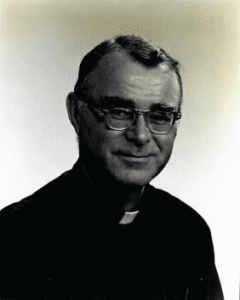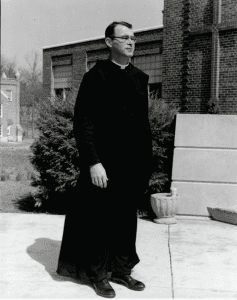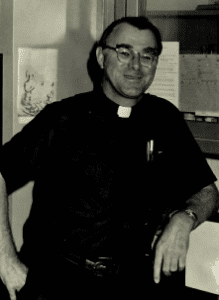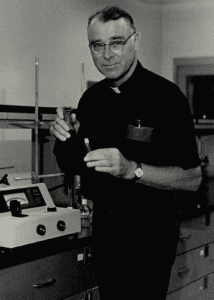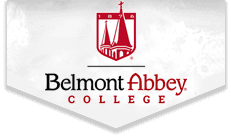Father Arthur J. Pendleton, O.S.B.
January 24, 1930 – February 21, 2020
Father Arthur was born on January 24, 1930, the son of Arthur N. Pendleton and the Irish-born Mary Agnes Ryan Pendleton. That set two constants for Father Arthur’s life. In the first place, he was intensely proud of his Irish heritage. On his application form for entrance to the abbey, he was careful to note that his mother had been born in Ireland. People may not have known that, as he was reserved in his display of Irish roots and was usually overshadowed in this regard by the far more flamboyant displays of Father Kieran. In the second place, this New England Yankee come south was likewise attached to his Rhode Island origins. All you had to do was listen to Father “Awtha” to know that. As one of the bystanders said to the Apostle Peter warming himself by the fire at the high priest’s house the night Jesus was betrayed, “Surely you are one of them, even your speech gives you away” (Mt. 26:73).
Father Arthur’s dedication to service also included service to his country in the United States Army. He was drafted in 1954 and served for sixteen months in Korea during the tense times following the Korean Conflict.
Father Arthur arrived here because, after finishing a Bachelor’s Degree in Textile Chemistry and Coloring from the Rhode Island School of Design, and an M.S. in Textile Engineering from the Institute of Textile Technology in Charlottesville, VA., he moved to the Carolinas to pursue what he thought would be a career in the textile industry. God’s career plans, however, led him to the monastery. He arrived in August 1958, made his first profession of vows on January 27, 1960 and his solemn vows in 1964. He was ordained a priest on June 4, 1964. In the monastery, Father Arthur served as Director of the Brothers from 1964-66. His enduring claim to remembrance, however, is that he has the record of having served as Prior under three different abbots and one administrator. This has undoubtedly served him well now by insuring the briefest of stays in purgatory. In particular, in the difficult times in our community in the late 1980s, Father Arthur’s steady and humble leadership kept the community together and guided us to better days. This was at no small cost to himself, not least of all because he had to undergo coronary bypass surgery in the midst of the crisis. Father Arthur was, in my estimation, our best monk. He was deeply serious about his monastic life without ever losing his joy. He could disagree strongly with confreres, but never held a grudge. He was often misunderstood but he never let go of charity. He embraced the teaching of the Rule on simplicity of life. When he was preparing to go to Rome after his retirement from teaching for a monastic renewal program at the Benedictine College of S. Anselmo, the instructions called for a pair of sturdy walking shoes, as the program would involve a good amount of walking. At the time, Father Arthur’s shoes probably dated back close to the time of St. Benedict. Father Arthur knew that the Rule spoke of the distribution of goods according to need, and, until something completely fell apart, he felt he did not need a replacement. It was necessary to order him under obedience to go out and buy a pair of good shoes.
Father Arthur possessed a radiance that came from faith and charity. He was always there for his confreres. During the three consecutive nights of over six-hour-long of public meetings about eighteen years ago which would determine the possibility of our property development and thus of the welfare of our community and college, Father Arthur was the one monk who always stayed until the very end. He was a transparently good man, totally without guile. He was an esteemed spiritual director for innumerable persons. I would not be here today but for Father Arthur. As the time for solemn vows approached, I was finding the trials of community life to be overwhelming. I went to Father Arthur and told him that I didn’t think I should stay. Father asked whether there were not some good things, too? When I responded that there were, he continued and asked about other good things, and I responded that yes, there were other good things. Finally, in his own kind way, he simply said, “Then I guess it’s not so bad after all, is it?” And my worries fell away.
Father Arthur’s memory is inextricably intertwined with his long service to Belmont Abbey College. He dutifully pursued further education, earning a second Master’s Degree in Chemistry at Notre Dame and his doctorate at Clemson. He taught over a period of forty years, retiring at last in 2000. Father Arthur was a formidable teacher because he was passionate about his subject and his students. Students regularly bewailed his demanding rigor and learned to appreciate his zeal only when they arrived in graduate school and found themselves singularly well prepared. One of his students from the early ‘70s has written, “My story about Fr. Arthur has to do with our Organic chemistry class. It was Fr. Arthur’s first year to teach organic chemistry… After about three or four weeks in the semester and just having the first test, many of us were struggling and not getting the material. After a bit of discussion, which Fr. Arthur permitted right there in class, he said, “what would [you] like me to do?” I spoke up and said, “start over.” After a few other students then chimed in, he said, ok and for the next two weeks we went back to the beginning of the book and he reviewed what we needed to learn. This was great and helped us all get back on track.” Students always remained at the center of Father Arthur’s teaching. He wanted them to learn what he knew they needed to learn. But it was this same formidable teacher to whom many turned for consolation, for help and for advice. Father Arthur was likewise diligent in his service on college committees and in his presence in the college community. He was a brilliant man. When he first began to have difficulties with memory, he underwent a neurological workup. The report indicated that, though Father Arthur was past his peak at that time, it was likely that during his prime he was functioning at a genius level. That helped explain to some of us why Father Arthur so often seemed to jump from one issue to another. He was making connections which simply leapt over the plodding thoughts of the rest of us. He was a serious scientist, a respected and beloved colleague, and a mentor to many in our college community. Upon retirement, Father Arthur received the Spirit of St. Benedict Award, which is given by the college to the member of the college community who best exemplifies the values of our college.
Upon retirement, Father Arthur took up what was likely his favorite assignment of all time at Belmont Abbey: He was the parking czar of the St. Leo Parking Lot. It seems that many of our students were in the habit of sleeping in until five minutes before class and then driving over and parking in the St. Leo lot, where they were not allowed to park. Father Arthur took on this job with delight, going out faithfully each morning in his neon vest and floppy hat and patrolling the St. Leo Lot. I don’t think he ever gave any tickets. He would simply approach an offending student with that serious look of his and ask, “You don’t want to park there, do you? I’ll have to give you a ticket.” The offender always meekly retired to the appropriate but more distant parking areas. Father Arthur loved this job because he loved interaction with people – all kinds of people. He was the unofficial greeter for visitors to Belmont Abbey College. Between Father Arthur and Rita Lewis, visitors to the college got the best welcome this side of heaven.
Father Arthur also became the campus grandfather in his retirement. He would place himself strategically on a bench in the Quad or along Abbey Lane, and wait for students to come along. He consoled, advised, encouraged, gently admonished and simply provided an open ear for students and their cares, hopes and anxieties. He was much in demand for Confession. One of our recent alums wrote the following about his relationship to Father Arthur: “I will miss him greatly as he was always the most gentle confessor and an amazing spiritual father and friend. He will remain in my heart and prayers for a very long time.” He was especially interested when a student came along with a Rhode Island connection!
There are some things you might not know about Father Arthur. He was intensely competitive. Back in the late ‘70s and early ‘80s, Betty Baker, Mike McLeod, and Eunice Cronin would get the students in the Biology Department, but others as well, together for volleyball behind the Science Building on Saturday afternoons. Father Arthur was a regular. It was initially a bit off-putting to experience Father Arthur yelling “Kill!” as he jumped up and spiked the ball at the net! He was an avid competitor also in handball. He was an accomplished tennis player who with amazing skill could place the ball pretty much where he wanted. His strategy was to rest calmly in roughly the same place while wearing down his opponent by keeping him running all over the court. I know that from experience! He was also not above placing the ball into his opponent if the opponent was trying to play the net. In recent monks, Father Arthur told one of our younger monks how he had once hit Sister Jeanne-Margaret, one of the Sisters of Mercy, whom he was playing in a match. However, he swore monk to secrecy because he didn’t want to get into trouble.
Father Arthur had an incurable sweet tooth. He simply loved sweets, especially, but not limited to, chocolate. He may have been serious and disciplined in other areas, but with desserts, all bets were off. It is our custom that, on one’s feastday, you can have a dessert of your choice. Father Arthur’s choice last year, not surprisingly, was chocolate cake. The following night, he finished the remaining half of the cake for supper!
God in His goodness allowed us to have a gentle and gradual farewell to Father Arthur in these recent years as his memory failed him. He was an exemplary monk, a holy priest, a brilliant scientist, passionate teacher, respected colleague, and a much-loved mentor, brother, uncle, confrere and friend. It is for these blessings, which God sent to us in Father Arthur Pendleton, that we have gathered to give thanks tonight.
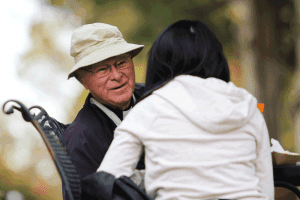
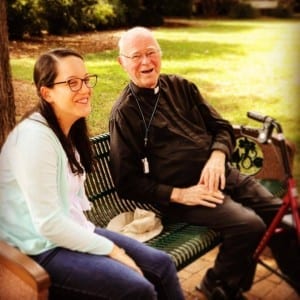
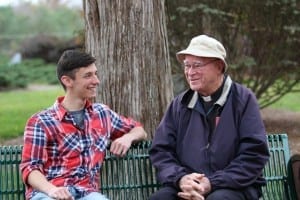
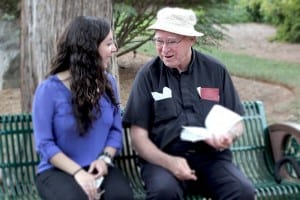
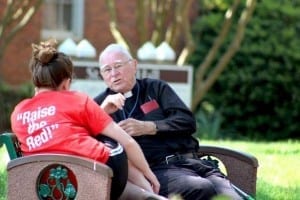
Father Arthur J. Pendleton, O.S.B.
Mass of Christian Burial
February 25, 2020
At the reception of Father Arthur’s body yesterday evening, as excerpts from the Prologue to the Rule of St. Benedict were read, it seemed so clear to me St. Benedict’s description of the life he envisioned for his monks had been lived in our midst by Father Arthur. “Listen, my son, to the precepts of the Master and incline the ear of your heart, and gladly take up and put into practice the admonition of a loving father, so that, by the labor of obedience, you may return to him from whom you have strayed…” Father Arthur listened all his life. He was an extremely intelligent man with a vast range of interests and intellectual curiosity. He read extensively, in the complex working of atoms and molecules as well as in an amazing breadth of books and articles he devoured, and he reveled in sharing what he had discovered in his reading of both the physical and the intellectual worlds. At the heart of his reading, however, was that essential prayer of the monk which St. Benedict prescribed for us, lectio divina – the daily meditation on the divinely inspired Word of God in the Bible. Father Arthur thought he had come to the South from his native Rhode Island many decades ago to pursue a career in the textile industry. But he heard with the ear of his heart another voice, which pointed to another career: Come to me, all you who labor and are burdened, and I will give you rest. Take my yoke upon you and learn from me, for I am meek and humble of heart; and you will find rest… And so Father Arthur came to the monastery, and here he found rest in Jesus, and he truly became meek and humble of heart. As a monk and priest, he showed us by his life the image this Scripture passage presents of Jesus. As one of our alumni said in his tribute to Father Arthur: “He was always the most gentle confessor and an amazing spiritual father and friend.”
The text of the Prologue continued: “This message of mine is for you, then, if you are ready to give up your own will, once and for all, and armed with the strong and noble weapons of obedience to do battle for the true King, Christ the Lord.” Father Arthur incorporated fully into his life that most fundamental virtue of St. Benedict’s Rule, obedience. There was a humorous instance last spring, in one of the precious moments of these last years as he struggled with dementia, when he worried too much about his obedience. One day the nurses in our infirmary told me that I had to speak with Father Arthur. He was upset. When I asked what was wrong, he responded in all innocence that he was supposed to die when he was ninety and so he was not supposed to be here. I don’t know where he got that idea that he was to die when he was ninety, but he was convinced that he needed to obey. I assured that it was all right because he was only eighty-nine. Once he understood that, he was fine. This little interaction was simply the expression, in the confusion of his memory, of his life-long discipline of giving up his own will in order to do whatever was asked of him. Perhaps, however, there was more to this than I realized. Father Arthur turned ninety on January 24, and here we are one month later! Indeed, Father Arthur always persevered in doing what he was asked to do, even when he felt inadequate to the task. It was his humble and steadfast presence that anchored our community through particularly difficult times. He lived the words of the Apostle: We are always courageous, for courage is the virtue which allows us to do what we know we ought to do even when we doubt our ability to see it through well. I think Father Arthur kept St. Paul’s final words to us today always in mind: We must all appear before the judgment seat of Christ, so that each one may receive recompense according to what he did in the body, whether good or evil. In fidelity to his monastic vocation, Father Arthur was diligent in fulfilling all his responsibilities as monk, priest, professor and friend. In particular, in his teaching career, he knew he was here to serve his students. He pushed them to do their best and to learn what they were supposed to learn, but he was also ever willing to help those who were struggling and find ways to help them succeed. He did this, because he loved them. He loved them because, as St. Paul has told us today, Therefore we aspire to please him, that is, please the Lord. I suspect that, at this moment, we are all hoping that we will have as easy a time when we appear before the judgment seat of Christ as we are pretty sure Father Arthur is having.
The final verse from the Prologue to the Rule we read at the service last evening was the concluding verse of the Prologue: “Never swerving from his instructions, then, but faithfully observing his teaching in the monastery until death, we shall through patience share in the sufferings of Christ that we may deserve also to share in his kingdom.” By God’s grace, Father Arthur accomplished this. Because he was passionate about things, because he was a competitor, he had continually to learn patience, but he was pretty good at the most important virtue, charity. While he was truly chastised a little in these later years, and especially in his final days, his struggle was, I suspect that final purification as gold in the furnace so that he could be the sacrificial offering worthy of God. The image from the Book of Wisdom of sparks darting through stubble is an apt one for Father Arthur, for his active and inquisitive mind darted among many things and would light up with the joy of understanding, often leaving the rest of us struggling to understand the connections he so easily made.
I said earlier that Father Arthur came to the monastery in response to Jesus’ call, Come to me…” The Christian life is a process of transformation into the image of Jesus Christ by the work of the Holy Spirit. It is clear that Father Arthur entered wholeheartedly into that process. In a wonderful autobiographical sketch dating to 1958, we wrote with charming candor: “I gather that I was quite dogmatic and single-minded even in college but had evidently become more bearable by 1957.” That single-minded dedication and passion for the truth endured. But in his humility, kindness, his gentleness as a confessor, his smile and the light in his eye, we saw reflected the transformation whereby he reflected more and more the love of God made visible in Christ Jesus Our Lord. This past Friday evening, listening with the ear of his heart, Father Arthur evidently heard that voice again, Come to me, all you who labor and are burdened, and I will give you rest. Take my yoke upon you and learn from me, for I am meek and humble of heart; and you will find rest. How can we anything but happy for Father Arthur, who so delighted in discovering the secrets of the physical world in his profession as a chemist, who was so eager to share with others what he had discerned in his contemplation of the world of the intellect and the spirit? How can we be anything but happy for Father Arthur, who always looked for the patterns and connections of things, and who now sees all of creation, which so entranced him, revealed clearly in all its splendor? Father, Lord of heaven and earth, for although you have hidden these things from the wise and the learned, you have revealed them to the childlike. Father Arthur was truly wise and learned, but most of all he learned the transparent and simple goodness of the childlike. We trust that Jesus, who called him and took him to himself, has fulfilled his word: No one knows the Father except the Son and anyone to whom the Son wishes to reveal him. How can we be anything but happy for Father Arthur, to whom the Son has now revealed the beauty of the Father, the Creator of the world which so fascinated and entranced Father Arthur? How can we be anything but happy for Father Arthur who has now come to take his own place in that surpassing beauty which has existed for all eternity?
Father Arthur was our finest monk. He was a holy and compassionate priest, a passionate teacher, a beloved confrere, brother, uncle, mentor and friend. He touched, healed and enriched many lives. His good works have multiplied beyond his imagining. This community was God’s gift to Father Arthur. Father Arthur was God’s gift to our community. Thanks be to God for so precious a gift, which we now return with gratitude to the Giver of all good gifts. Amen.
